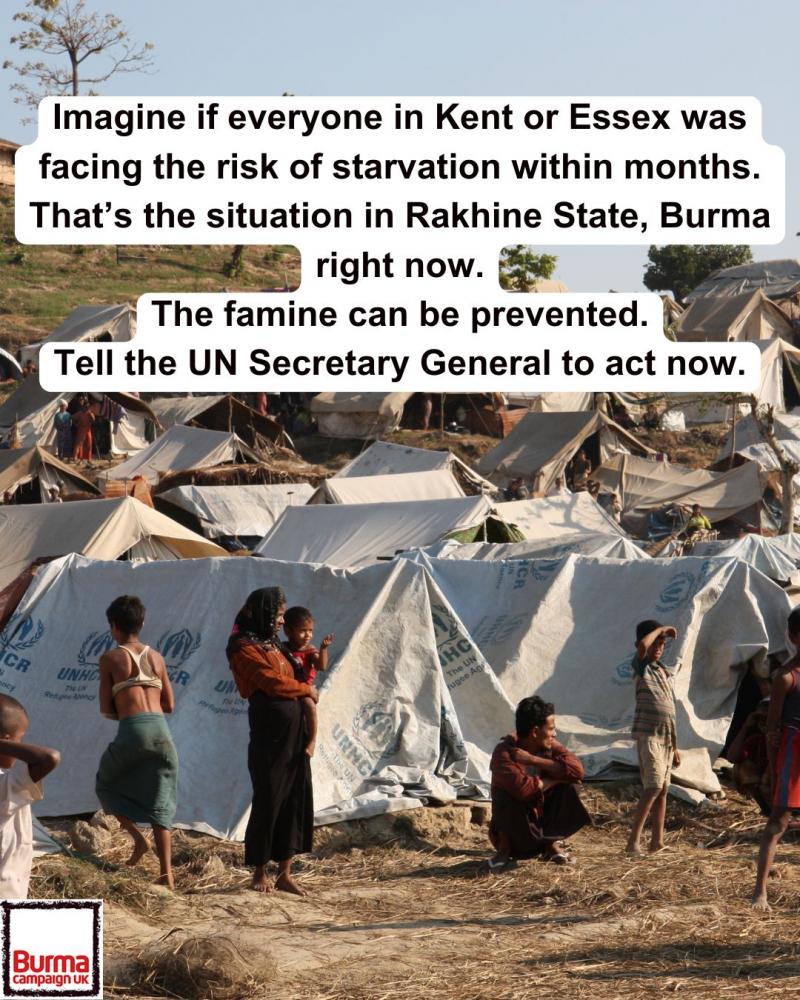UN Secretary General António Guterres: Act Now to Prevent Famine in Rakhine State, Burma
The United Nations has warned that the people of Rakhine State, Burma/Myanmar, face famine in 2025 unless urgent action is taken.
Rakhine State is already in crisis, with the Burmese/Myanmar military launching indiscriminate airstrikes and artillery attacks and placing severe aid and trade restrictions on Rakhine State. More than half a million people are already displaced, many facing desperate food shortages.
We the undersigned call on the UN Secretary General António Guterres to travel to Bangladesh and begin negotiations on opening an emergency aid corridor into Rakhine State, ensuring emergency aid reaches those in areas no longer under Burmese military occupation. This must be followed by longer-term agreements on opening the border for aid and trade.
Please do not wait until the famine starts. Act now to prevent famine.
Letter to the UN Secretary General
Dear UN Secretary General António Guterres
“Rakhine faces the imminent threat of acute famine.” This is the stark warning from the United Nations Development Programme.
Rakhine State (also known as Arakan State) is in western Burma, bordering Bangladesh in the North. The largest ethnic group there are Rakhine, but many ethnic and religious minorities live there, including the Rohingya.
The Arakha Army, mostly made up of ethnic Rakhine people, has been fighting to free the state from Burmese military rule and has taken over large parts of the state. The Burmese military have used every tactic they can to try to weaken resistance to their occupation of Rakhine State. Click here to read the full letter.
They have launched indiscriminate airstrikes and artillery attacks, exploited ethnic and religious tensions to try to divide and rule, and placed strict restrictions on aid and trade, including seeds and fertiliser, into the areas where they have lost control.
2 million people face starvation.
By spring 2025 it is predicted the state will only produce 20% of the food it needs. This is on top of well over 600,000 people who have already fled their homes and jobs. Around 250,000 of those are Rohingya, many of whom who have fled not just attacks by the Burmese military, but also attacks by the Arakha Army. The trade embargo is creating mass unemployment.
This situation is already a crisis deserving your personal attention.
A business-as-usual approach to this crisis, delegating responsibility to UN agencies or envoys, will not work. It hasn’t worked in the past regarding previous crises. There is no evidential basis to believe this time will be any different.
Trying to negotiate with the Burmese military to allow greater humanitarian access and lift trade restrictions into the areas of Rakhine State now administered by the Arakha Army will not succeed. It is a deliberate policy of the Burmese military to use starvation as a tactic to force populations to submit to its will.
The Burmese military is already placing some of the most severe restrictions and conditions on humanitarian aid seen anywhere in the world. These restrictions violate international law. It will attempt to leverage the maximum advantage from the process of negotiations, forcing UN agencies to compromise even more basic humanitarian principles for the sake of limited access which will not solve this crisis.
Instead, a humanitarian corridor from Bangladesh needs to be opened. This should already have happened months ago.
Humanitarian aid corridors have historically faced challenges in their establishment and implementation, but these challenges must be overcome, as the alternative is famine.
An aid corridor to deal with the current crisis then needs to be adapted for the longer-term humanitarian and development needs of Rakhine State. It needs to be just the start of a fundamental review of the delivery of humanitarian assistance to Burma. It is not credible or acceptable for the majority of UN aid and assistance to Myanmar to be channeled via areas occupied by the Burmese military, giving them effective veto power over who gets aid, who delivers it and what aid is delivered.
With increasingly large areas of Burma no longer occupied by the Burmese military, and these areas being where the majority of urgent humanitarian need is, a change of approach is needed. Similar arrangements with other neighbouring countries will be needed to ensure UN and other humanitarian aid reaches those most in need.
Opening up the Bangladesh border for trade into Rakhine State can also help alleviate the oncoming famine by boosting the local economy and enabling essentials for agriculture, constructions, medicines, to be imported. It needs to be an integral part of negotiations to help prevent the oncoming famine.
It is significant that both the Arakha Army and Rohingya civil society organisations are united in calling for the Bangladesh border be opened for aid and trade.
The United Nations has a track record of failing to act in response to warnings of impending crises in Burma, and a mixed record on responding to those crises. We now have another stark warning, from one of your own agencies, of impending famine. Your personal status and authority are needed to try to prevent this crisis. You are not powerless to act. We urge you to act now.

